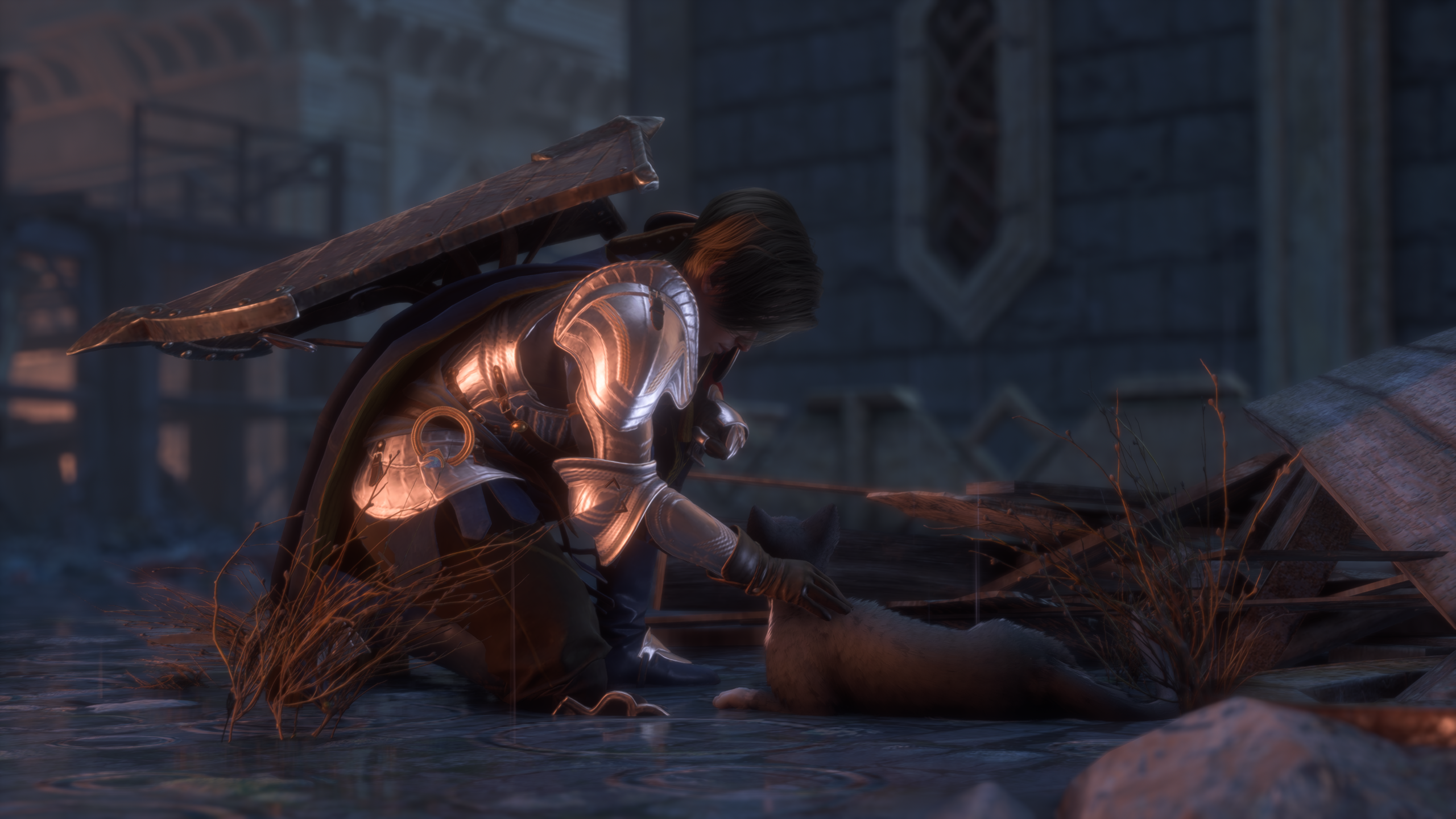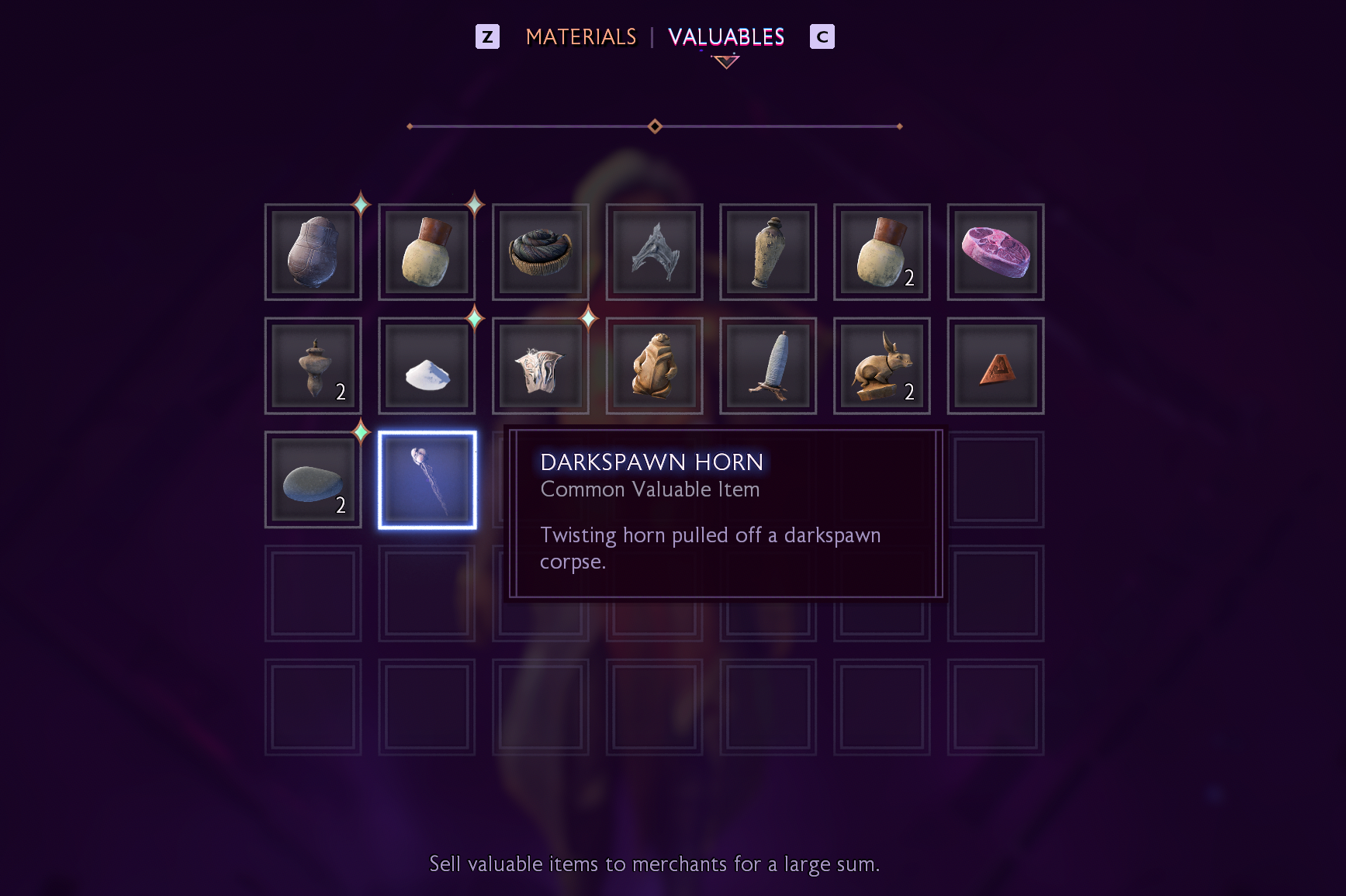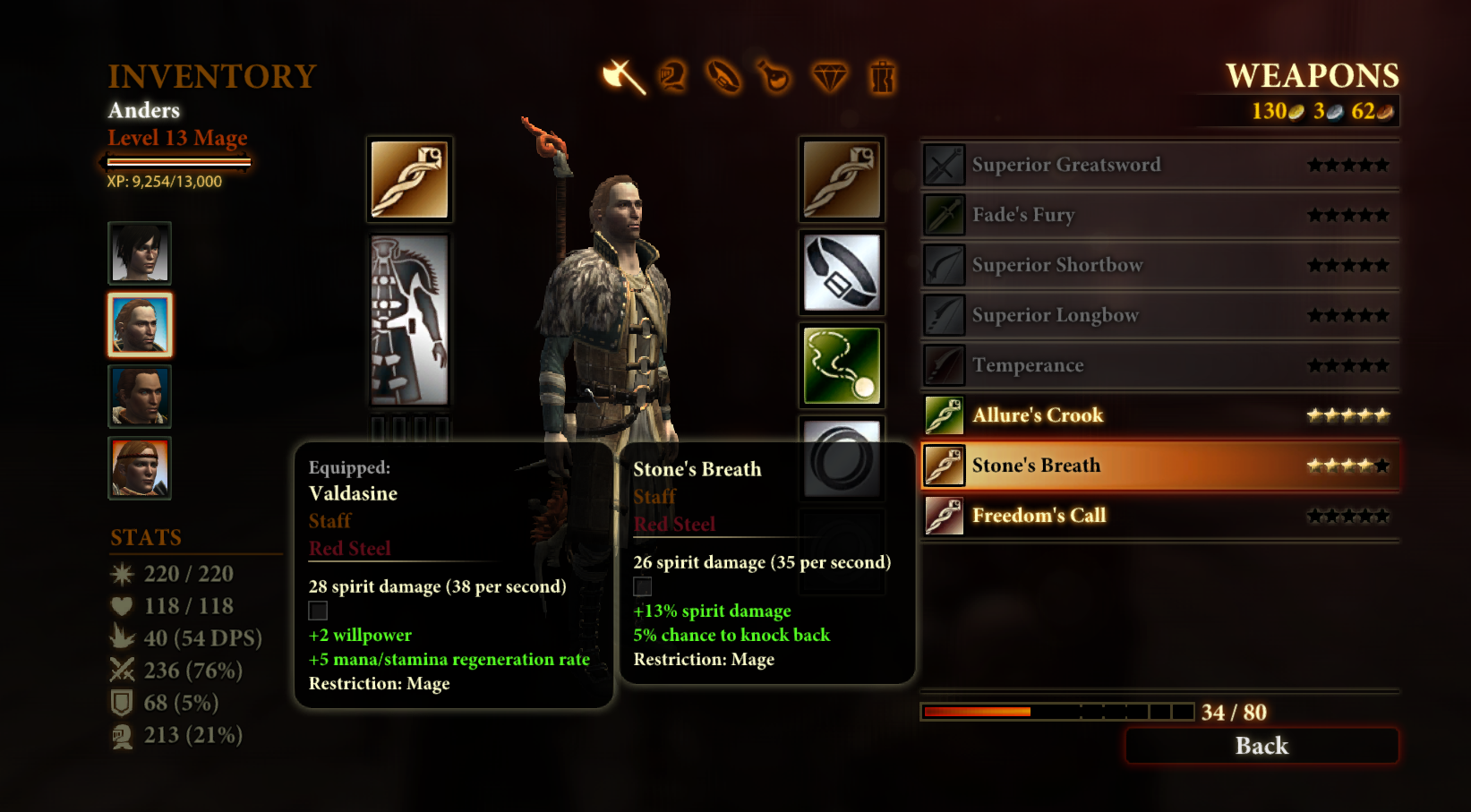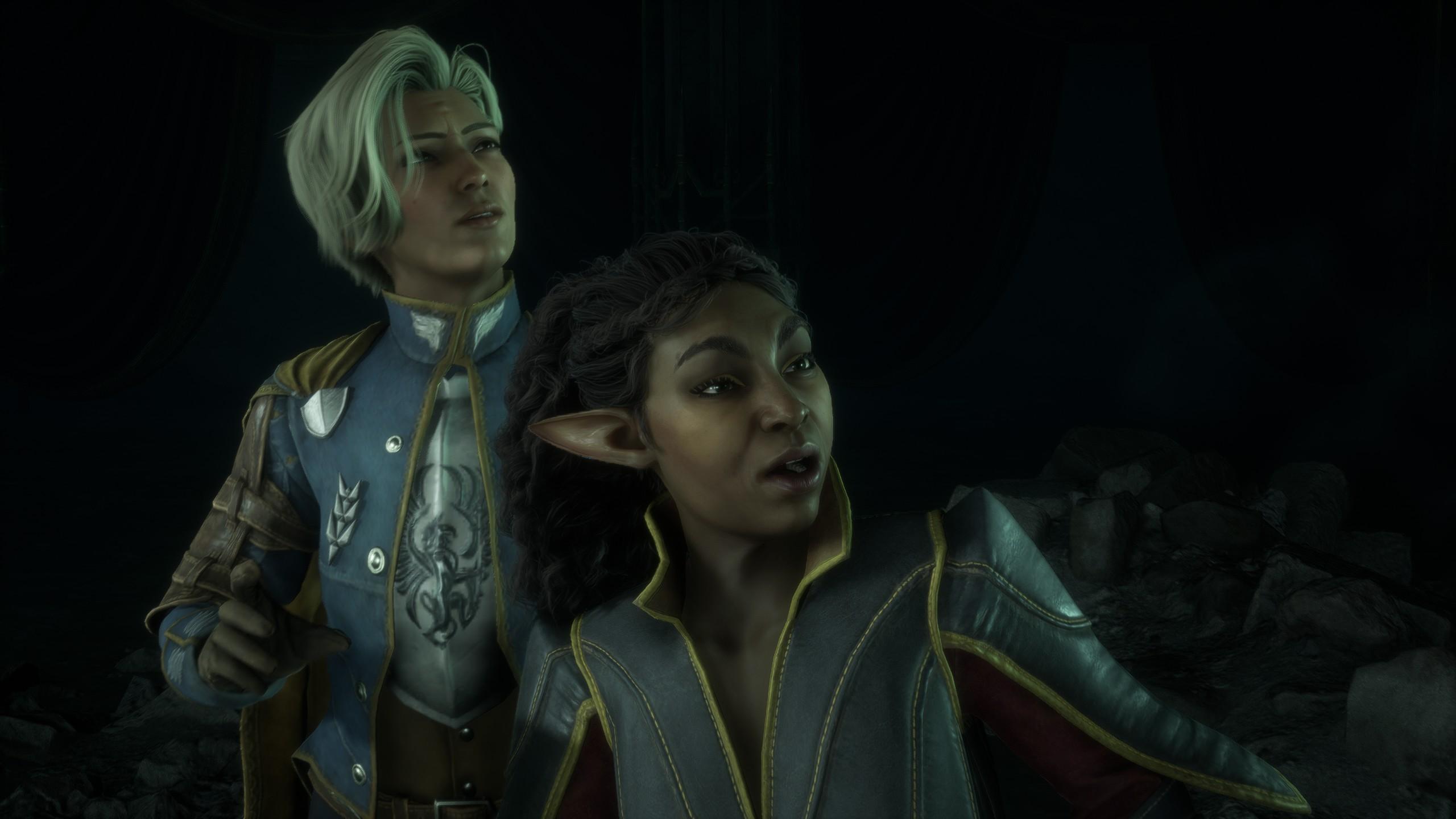My goal here is to discuss Veilguard as a whole without talking much about specific plot-beats or decisions, after completing my own playthrough. I wouldn't mind reading this before playing, and I'm very spoiler-averse.

I wrote a big, 5000 word draft talking about specific things I felt fell flat with Veilguard last weekend - I had a good time writing it, I got a lot out of my head, and came to understand a lot better why my opinion on the game was souring over time. The draft itself is nigh-unreadable, but the process was valuable. It got me thinking about the relationship we have to media, and specifically the ways we analyse media that isn't necessarily made for deep analysis.
I know I'm not the only one who loves to watch "trash" and pick it apart for themes, ideas, some kind of thesis statement. I understand this to be something of a core tenet of Tumblr fandom - we're still thinking about this thing we like, and as a result we have worked out a character's whole inner world from a dozen lines of dialogue. I respect that shit. There's a lot of satisfaction in taking a piece of pop media, treating it like any work of literature, and figuring out how it all fits together.
So I played Veilguard, I enjoyed it a great deal, probably the most 7/10 game ever made - extremely competent, fun to play, hard to put down.
So I tried to think about it. Pick it apart. Find themes.
And I struggled?
I'm not saying there's nothing - there are clearly themes about trauma, and fear, and acceptance, there's this pervading sense that there's a millenial work-life balance depersonalisation thing going on. There's a big running theme around feeling the weight of our own decisions.
But to actually play around with, rotate in my mind so to speak... there really just isn't much to work with. It's very thin on the ol' narrative backbone. I think the most obvious lack is that the companions don't really have blindspots. They have A Problem and A Quirk, sometimes related, and not much more. There's no "Sten killed a family" or "Solas is clearly racist" or "" The thing about feeling our decisions, that just isn't reflected in the companions and if you pick a certain type of dialogue option consistently it falls incredibly flat.
I'll look over my partner's shoulder at her feed and there's just screeds and galleries trying to find the seeds of a half-decent romance in the most obvious male love interest, dissecting a 1-second animation and trying to build an entire unspoken character around it, nestled somewhere in his hours of voiced dialogue. Meanwhile I rewatched Buffy Season 2 recently and in Spike's first hour on screen he sets up himself, his beautiful wife, the central conflict, and a thesis statement about Buffy that the viewer can dissect.
I just don't think there's much meat on this bone, to be honest.
I wrote 10x this many words picking it apart, and after doing so I just don't care to edit and post it.
I decided to stash that post and write this one this morning when I had a shower thought - Dragon Age isn't better off with this game's release. I think rushing this out and setting a bunch of answers in stone, while rushing the writing (thus undercutting the foundation of the series - the writers are the core, the characters are the glue) and vindicating every bad instinct their parent company had that got them here. "Oh your single player action game did poorly? Maybe you should try that live-service thing again."
I think they should have taken the core of a game they had here, gutted the writing and setting and plonked the exact same gameplay on some new IP, to let Dragon Age stay the slightly-plodding but endlessly-permutative mine of headcanons and personal preferences it was for the 15 years leading up to it. Bioware get all their "return to form" reviews and folks like me who feel we can't pick it apart get to justify it with "Well at least it's not Dragon Age."
Instead, my review is just "Well, it's not Dragon Age."
Veilguard has loot, but I feel like it bucks the trend of the last decade or so of RPG design (I wonder if there's something deeper there...) in that it's not about filling your inventory and comparing trousers. I don't know if they cribbed it from somewhere else, I haven't played every game, but I really like their implementation - with some caveats.
There are really two inventories in Veilguard - Equipment and Junk, and both are improved over its predecessors.
Junk
 | Vital flavour text
| Vital flavour text
Junk is not new, and has been in the series since since DA2 I think - there are items you can pick up that exist solely for flavour and to be sold to vendors. In DA2 and DA:I they also take up valuable inventory slots, which I think is intended to encourage the player to "return to base" and sell stuff, interact with shops more. The problem is that it's a massive ball-ache.
Nobody likes finding a nice new pair of trousers and having to drop something to make room for it - it's a fundamentally irritating system. So Veilguard bins the inventory limit like a player installing their first mod, but this leaves a problem - the junk no longer serves any mechanical purpose beyond trading it for cash, so why not simply give the player cash? Ok you'd lose some flavour-text, but junk items rarely make good use of that anyway.
Veilguard solves it in 2 ways, both using the Faction System.
I won't go into detail, but Veilguard contains a handful of factions the player can curry favour with, and one of the ways you can do that is by selling your junk to them. This immediately removes the no-brainer aspect of immediately selling all your junk at the first shop - sure you'll have cash, but maybe you could get some favour elsewhere if you sell with a bit more care?
They also have certain items be worth more to certain factions - they'll pay much better for trophies of their enemies, and the like.
This strikes me as a super elegant way to solve the no-brainer junk-selling problem, keep junk relevant, and also soften the harshness of a faction-system that does require a bit of care to keep favour high. It's very video-gamey, but it works cleanly and kept me thinking about my selling decisions all game, right to the very end.
Equipment
This one might be a bit more controversial - in Veilguard, they've done away with the traditional loot system altogether, and instead each class has a pool of a dozen or 2 of each item type - a bunch of swords, shields, staves, robes, hats, boots, etc. to choose from that stay broadly the same in purpose throughout the game, but they have 2 power tracks - Level and Rarity. Level is just how big the numbers are, Rarity has 5 levels that unlock traits - special effects like "does 40 points of fire damage" or "enemies drop more gold". After a while, you stop picking up new gear and "finding loot" just upgrades the rarity of the stuff you already have, unlocking extra powers.
This drastically reduces trouser-comparison, because when I see I just picked up "Fire Sword -> Epic - Now it makes folk explode" and I'm doing some kind of Ice thing, I both don't need to consider it or remember to sell it later - it's just in my inventory if I ever decide to do the firey-explodey thing later.
There are some Unique items around to break the rule, but I generally found them to be fun gimmicks that you might be want to build an entire character around if you're some kind of sicko, nothing I was super keen to use myself.
Getting to just settle into a build is SO MUCH nicer than having to weigh up "28 damage, +15 attack, +2% attack speed" against "25 damage, +4 fire damage, +5% fire damage" every time you loot a corpse - can you tell I've been playing DA2?.
 | WHO CARES?
| WHO CARES?
The Downside
I'll be honest, I barely touched my equipment between hours 40 and 70. I pretty much found a build I liked, took perks that improved it, and used the same sword+shield+abilities for the entire mid-late-end game. This isn't a massive problem with the game balance, I really enjoyed the build I made, but there's a certain euphoria in the RPG experience of End-Game Loot - finding a staff that automatically melts undead or a shield that has a magical explosive shield-bash skill attached. That shit's fun, y'know? In a sense, I had fully explored Veilguard's combat system half-way through, and was just executing on it for the next 30 hours.
I beat an end-game boss at the 40-hour mark because the numbers were only really going to go up so much from there - I had all the mechanics unlocked. That felt good, but it was quite a grindy fight with such bad numbers. There was no point waiting to do it later, because I knew nothing major was going to change about my combat options and I had a winning strategy.
Overall though, this system is a massive improvement over the old way of doing things. They just need to get a bit zanier with the Unique drops - they seemed extremely balanced by all having massive downsides, and I don't know that it's necessary to do that with RPG gear. Not that this is an RPG, really.
My goal here is to discuss Veilguard as a whole without talking much about specific plot-beats or decisions, after completing my own playthrough. I wouldn't mind reading this before playing, and I'm very spoiler-averse.

If you want the short version - I recommend it, but not as a Dragon Age fan.
I feel a game like Veilguard encourages the formation of hot takes more than most - it's a big-budget, long-awaited sequel from a company that has... a poor recent track record. They've released 2 new games in the decade since the previous entry and they were, respectively, a let down and a disaster.
Mass Effect: Andromeda had all the hallmarks of an under-resourced over-pressured development, with grand ideas and limited experience behind it. Disregarding a launch rife with meme-able glitches, it still fell extremely short of the expectations of a Mass Effect fan looking to dive back into a world they loved. It was Mass Effect flavoured videogame rather than more Mass Effect. It's lucky they set it in another galaxy centuries removed from the main series, because that means they can ignore it entirely as they make ME4 - and they'll lose nothing of value in the process. The inverse is probably why they did it that way - they didn't need to port your Shepard's decisions into the game because they were irrelevant details in Andromeda, no matter how much they mattered to you.
Anthem was a complete flop of a concept, sharing enough of Mass Effect's aesthetic (suits of armour and double knees, primarily) to invite the comparison while being a clear attempt to claim an early-and-yet-too-late share of the live-service squad-shooter market. I never played it, you never played it, but it sets the scene for our main topic.
Veilguard shares a lot of the same problems as its predecessors - word is they had to broadly restart development after starting down a live-service path, and you can really feel the scars of that process. It feels insubstantial. The character relationships feel extremely of-a-procedure, encounters respawn very quickly so revisiting areas can add up to a massive amount of time, and almost nothing happens off the beaten path - you may think you've left the beaten path, but you're actually just warming it up for when you beat it later. On top of all this, Veilguard relies extremely heavily on the player having done their reading.
I want to harp on a bit about this last part. The main plot contains a handful of revelations that rely heavily on knowledge of Inquisition's DLC which started releasing months after the game's initial release - the only people who played those DLC are die-hard fans doing multiple playthroughs, or late-comers to the series who bought some kind of "Ultimate Edition" or some such. I assume the majority of DA:I players never played these DLC because I never did, and also I have professional experience that would indicate it. This is something of a pattern for Bioware, to the point where it's beyond a theory for me -
- Dragon Age: Origins - Awakening (that's the official punctuation, I checked) sets up the primary conflict in DA2
- Dragon Age 2: Legacy sets up Inquisition entirely.
- Mass Effect didn't have Batarians until they added them in the Bring Down the Sky DLC
- Mass Effect 2: Arrival is a must-play piece of context for Mass Effect 3.
- At this point, I am about 95% certain that Mass Effect 4 is going to build directly on the Leviathan DLC, because that's the only reason I could ever think of to leave it out of the base game. This is me making my prediction explicit.
Anyway, back to Veilguard.
There are a handful of moments throughout where Veilguard absolutely sings as an action-adventure game, namely the big action set-pieces and their associated cutscenes, and the first 1/3 or so of the game when you just get to run around solving puzzles and doing sidequests. Seeing a treasure chest you can't get to, relating it to a nearby puzzle, and mapping out a solution is very satisfying during this period of the game. Each hub area in the game has its own kind of theme, but honestly the first one is by far the best - really well conceived, nicely executed, and doesn't overstay its welcome. Returning to it always feels nice. I wish I could say the same for the last couple, which are at best a slog when you're clearing them up in the mid-late game.
I diverted away from the set-pieces - they fuck. The finale is extremely cool, but throughout the game there are these critical missions that always feel great, getting the crew together and seeing non-party team-members scurrying around the periphery from time to time - it's crack to me. Add that to some truly spectacular visual work, art, and music, and you have a formula for some of the best action-adventure gameplay I've experienced in years.
It's just not Dragon Age, to me. Dragon Age is about characters, stories, and grey morality - poring over contradictory lore and trying to figure out who's got the better of it - there's some massive supernatural threat but the real problem you face is People and their shitty little schemes. "I won't help you save the world until you help me screw over my business partner" is such pathetic bullshit but that's Dragon Age! These people are pathetic! "Oh we'd love to help you prevent our extinction but there's an election on, see" so you're the only sane person in Thedas, crawling through mud and blood and spit and shit, not necessarily doing the right thing but doing the things that need done - at least you think they need done? Surely they need done.
This game lacks that spirit. Our protagonist has it to an extent, but Veilguard doesn't - Veilguard has all the answers, and it's happy to tell you them.

 | Vital flavour text
| Vital flavour text | WHO CARES?
| WHO CARES?